
farm animals pdf
Farm animals play a versatile role in agriculture‚ contributing to food security‚ economic stability‚ and sustainable farming systems while ensuring animal welfare and environmental harmony.
1.1. Definition and Importance of Farm Animals
Farm animals are domesticated species raised for food‚ labor‚ or other agricultural purposes. They include cattle‚ poultry‚ pigs‚ sheep‚ goats‚ and horses. These animals are vital for food security‚ providing meat‚ dairy‚ and eggs. Beyond nutrition‚ they contribute to economic stability‚ supporting livelihoods and fostering sustainable farming systems. Ethical considerations and animal welfare practices ensure their well-being‚ aligning with human values and environmental harmony. Farm animals also play cultural and historical roles‚ symbolizing tradition and resilience in many societies. Their importance extends beyond agriculture‚ influencing ecosystems and human well-being globally. Proper care and management of farm animals are essential for maintaining biodiversity and promoting ecological balance.
1.2. Role of Farm Animals in Agriculture
Farm animals are central to agricultural productivity‚ providing essential resources like meat‚ dairy‚ and eggs. Beyond food production‚ they contribute to labor‚ fertilizer‚ and land management. Cattle and horses assist in plowing fields‚ while manure enriches soil fertility. Poultry and pigs support pest control and nutrient cycling. Their role extends to sustaining ecosystems‚ promoting biodiversity‚ and maintaining agricultural balance. Ethical farming practices ensure their well-being‚ aligning with sustainable agriculture. By integrating animal husbandry with crop production‚ farmers enhance efficiency and reduce environmental impact. Thus‚ farm animals are indispensable in fostering food security‚ economic growth‚ and ecological harmony‚ making them a cornerstone of agricultural systems worldwide.
Types of Farm Animals
Farm animals encompass a diverse range of species‚ including cattle‚ poultry‚ pigs‚ sheep‚ goats‚ horses‚ and others‚ each contributing uniquely to agriculture through labor‚ dairy‚ meat‚ and wool production.
2.1. Cattle: Breeds and Uses
Cattle are among the most valuable farm animals‚ known for their versatility. Breeds like Holstein are renowned for dairy production‚ while Angus and Hereford are prized for beef. They are raised for milk‚ meat‚ and hides‚ with specific breeds optimized for each purpose. Additionally‚ cattle serve as draft animals in many regions‚ aiding in plowing fields and transportation. Their adaptability to various climates and farming systems makes them indispensable in agriculture. Beyond food production‚ cattle contribute to leather and fertilizer industries‚ emphasizing their multifaceted role in farming economies. Proper care and selective breeding ensure high productivity‚ making cattle a cornerstone of sustainable and efficient agricultural practices worldwide.
2.2. Poultry: Chickens‚ Ducks‚ and Turkeys
Poultry‚ including chickens‚ ducks‚ and turkeys‚ are integral to farming systems worldwide. Chickens dominate egg and meat production‚ while ducks and turkeys are valued for their unique flavors and cultural significance. Poultry farming is a vital source of protein‚ contributing to food security and livelihoods. Breeds like Leghorns are bred for egg production‚ whereas Broad-Breasted Whites are optimized for meat. Ducks are often raised for eggs and feathers‚ while turkeys are primarily used for meat during holidays. Poultry also provides organic fertilizer and biogas‚ enhancing farm sustainability. Biosecurity practices are crucial to prevent diseases‚ ensuring healthy flocks. Their adaptability and productivity make poultry a cornerstone of modern agriculture‚ supporting both small-scale and industrial farming operations effectively.
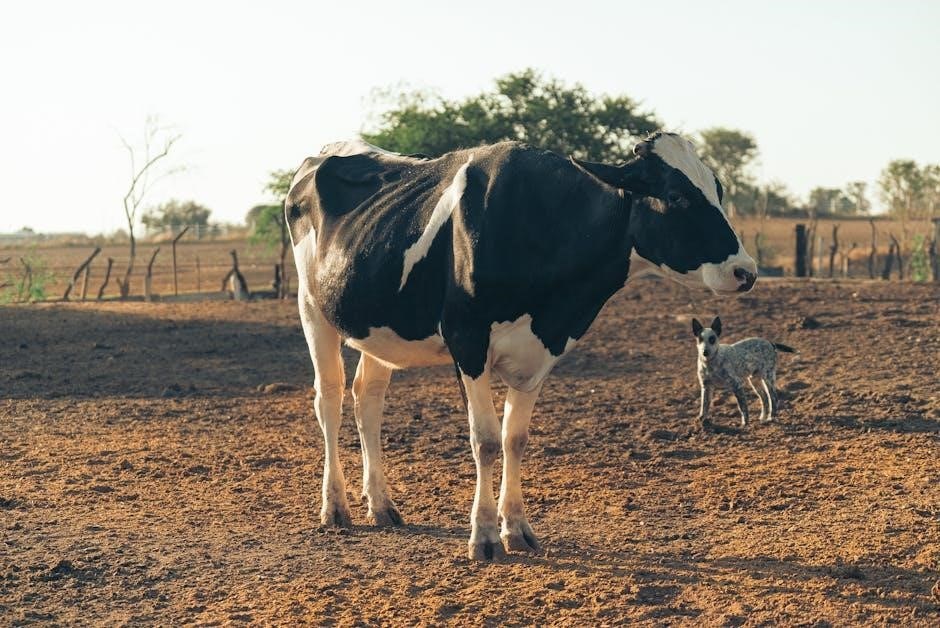
2.3. Pigs: Their Role in Farming
Pigs are a cornerstone of livestock farming‚ primarily raised for meat‚ with breeds like Hampshire and Duroc excelling in production. They also contribute to leather and biofuel industries. Pigs are known for their efficient feed conversion‚ making them a key protein source globally. Their manure is rich in nutrients‚ often used as fertilizer‚ enhancing soil fertility and supporting crop growth. Welfare practices‚ such as adequate housing and nutrition‚ are essential for their health and productivity. Sustainable farming practices aim to reduce environmental impact while maintaining pig well-being. Their adaptability to diverse farming systems makes them a vital component in both small-scale and large agricultural operations worldwide‚ ensuring food security and economic stability for many communities.
2.4. Sheep: Characteristics and Uses
Sheep are essential farm animals‚ valued for their wool‚ milk‚ and meat. Known for their hardiness‚ sheep thrive in diverse climates and terrains‚ making them adaptable to various farming systems. Breeds like Merino are prized for their fine wool‚ while others‚ such as Suffolk‚ are raised for meat. Sheep play a crucial role in landscape management through grazing‚ helping maintain open spaces and biodiversity. Their gentle nature and social behavior make them easier to handle compared to other livestock. In addition to their economic contributions‚ sheep are integral to cultural traditions in many regions‚ symbolizing resilience and sustainability in agriculture. Their ability to convert grass into high-quality products makes them a vital part of farming economies worldwide.
2.5. Goats: Dairy and Meat Production
Goats are highly versatile farm animals‚ primarily raised for dairy and meat production. Known for their adaptability‚ goats thrive in diverse environments‚ from small-scale farms to large agricultural systems. Popular breeds like Alpine and Saanen are renowned for their high milk yield‚ while others‚ such as Boer‚ are prized for their meat. Goats play a significant role in sustaining rural economies‚ providing nutritious products like cheese‚ butter‚ and lean meat. Their ability to graze on marginal lands makes them ideal for land management‚ reducing the need for pesticides and fertilizers. Additionally‚ goat farming supports biodiversity and contributes to sustainable agriculture‚ ensuring both economic and environmental benefits. Their resilience and productivity make goats a cornerstone of many farming systems worldwide.
2.6. Horses: Their Role in Farming
Horses have historically been integral to farming‚ serving as powerful draft animals for plowing fields‚ transporting goods‚ and assisting in agricultural tasks. Their strength and endurance make them invaluable in labor-intensive farming operations. Versatile breeds like Clydesdales and Percherons are commonly used for heavy work‚ while lighter breeds may assist in herding or riding. Beyond physical labor‚ horses contribute to sustainable farming by reducing the need for machinery‚ thereby lowering fuel consumption and environmental impact. Additionally‚ horses provide companionship and emotional support to farmers‚ fostering a unique bond. Their historical significance and continued relevance highlight their enduring importance in agricultural systems worldwide‚ blending tradition with modern practices.
2.7. Other Farm Animals (Rabbits‚ Bees‚ etc.)
Beyond the common livestock‚ other farm animals like rabbits and bees play significant roles in agriculture. Rabbits are valued for their meat and as a sustainable protein source‚ requiring minimal space and resources. Bees are indispensable for pollination‚ directly impacting crop yields and biodiversity. Their role in maintaining ecosystem health is crucial. Other animals‚ such as ducks‚ geese‚ and even fish‚ contribute to diverse farming systems by providing eggs‚ meat‚ and pest control. These smaller-scale animals often thrive in organic or smallholder farming‚ offering versatility and resilience. Their integration enhances farm productivity while promoting ecological balance and sustainability. This diversification supports farmers in meeting various market demands and adapting to environmental challenges.
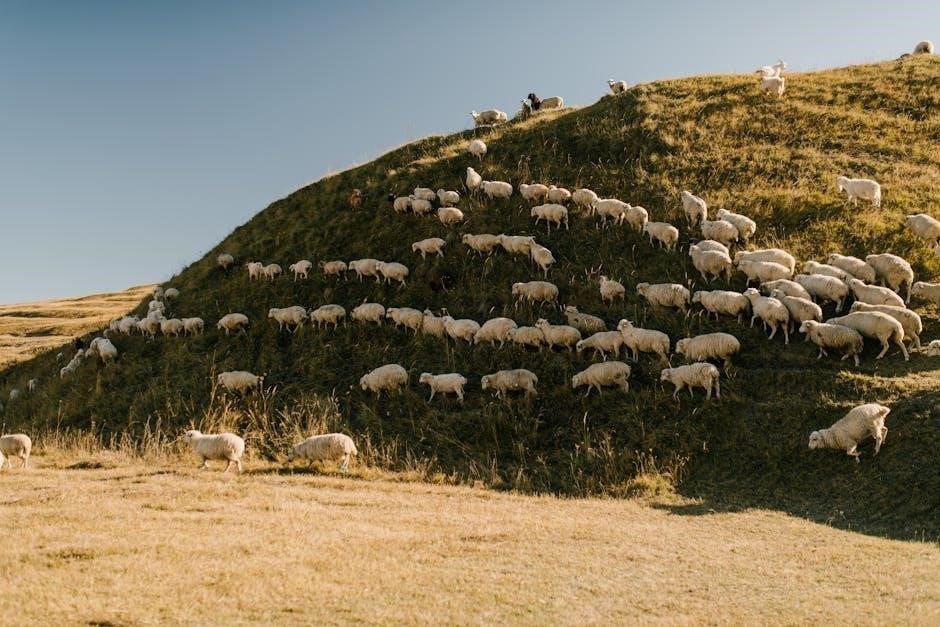
Welfare of Farm Animals
Farm animal welfare focuses on ensuring their physical and emotional well-being through proper care‚ ethical treatment‚ and sustainable farming practices to enhance their quality of life.
3.1. Importance of Animal Welfare in Farming
Animal welfare is crucial for ethical‚ sustainable‚ and productive farming. Ensuring the well-being of farm animals promotes a healthy and efficient agricultural system. Happy animals are less likely to suffer from diseases or stress‚ which directly improves productivity and product quality. Ethical treatment fosters trust among consumers‚ supporting the demand for humane and sustainable products. Additionally‚ good welfare practices reduce environmental impact by minimizing waste and optimizing resource use. Implementing proper care guidelines ensures animals thrive‚ contributing to long-term farm profitability. Prioritizing animal welfare also aligns with global sustainability goals‚ making it a cornerstone of modern farming practices.
3.2. Ethical Considerations in Raising Farm Animals
Ethical considerations in raising farm animals involve ensuring their rights and well-being are prioritized. Farmers must provide adequate living conditions‚ proper nutrition‚ and humane treatment to prevent suffering. Issues like overcrowding‚ stress‚ and pain management are critical ethical concerns. The use of antibiotics and growth hormones raises questions about animal health and environmental impact. Ethical farming practices promote natural behaviors‚ reducing reliance on industrial methods. transparency in animal treatment builds consumer trust. Regulations and certifications‚ such as organic standards‚ help guide ethical practices. Balancing productivity with compassion is essential for sustainable and morally responsible farming systems that respect animal dignity and contribute to a healthier planet. Ethical farming is not just a choice but a necessity for future generations.
3.3. Impact of Farming Practices on Animal Well-being
Farming practices significantly influence the well-being of farm animals. Intensive methods often lead to overcrowding‚ stress‚ and increased susceptibility to diseases. Conversely‚ sustainable practices like free-range systems and organic farming promote better health and natural behavior. The use of antibiotics in industrial farming raises concerns about animal welfare and environmental impact. Poor waste management can contaminate habitats‚ harming both animals and ecosystems. Ethical practices‚ such as providing adequate space and proper nutrition‚ are essential for maintaining animal well-being. Research shows that smaller-scale‚ diverse farming systems often result in healthier animals and lower environmental pollution. Balancing productivity with animal care ensures a sustainable and humane farming system.
Management Practices for Farm Animals
Effective management of farm animals involves proper housing‚ feeding‚ health care‚ and biosecurity to ensure productivity and animal well-being while maintaining environmental sustainability and ethical standards.
4.1. Housing and Living Conditions
Proper housing and living conditions are vital for the health‚ productivity‚ and welfare of farm animals. Adequate shelter protects animals from extreme weather‚ predators‚ and stress. Housing should provide sufficient space‚ natural light‚ and ventilation to ensure comfort and reduce disease risks. Clean living environments‚ including regular cleaning of stalls and pens‚ are essential for maintaining hygiene and preventing infections. Additionally‚ access to outdoor areas or pastures can enhance animal well-being. Biosecurity practices‚ such as controlling pests and isolating new animals‚ further safeguard health. Sustainable housing designs also consider environmental impact‚ such as waste management and energy efficiency. Overall‚ optimal living conditions contribute to both animal welfare and farm productivity.
4.2. Feeding and Nutrition
Proper feeding and nutrition are critical for the health‚ growth‚ and productivity of farm animals. A balanced diet ensures optimal energy‚ protein‚ and nutrient intake‚ tailored to the animal’s age‚ breed‚ and purpose. High-quality feed‚ such as hay‚ grains‚ and concentrates‚ should be provided regularly. Access to clean water is essential to prevent dehydration and maintain overall health. Overfeeding or underfeeding can lead to health issues‚ so careful planning is necessary. Nutritional supplements may be added to enhance growth or address deficiencies. Sustainable feeding practices‚ like using locally sourced feed and minimizing waste‚ promote environmental efficiency. Proper nutrition not only improves animal well-being but also increases productivity and profitability for farmers.
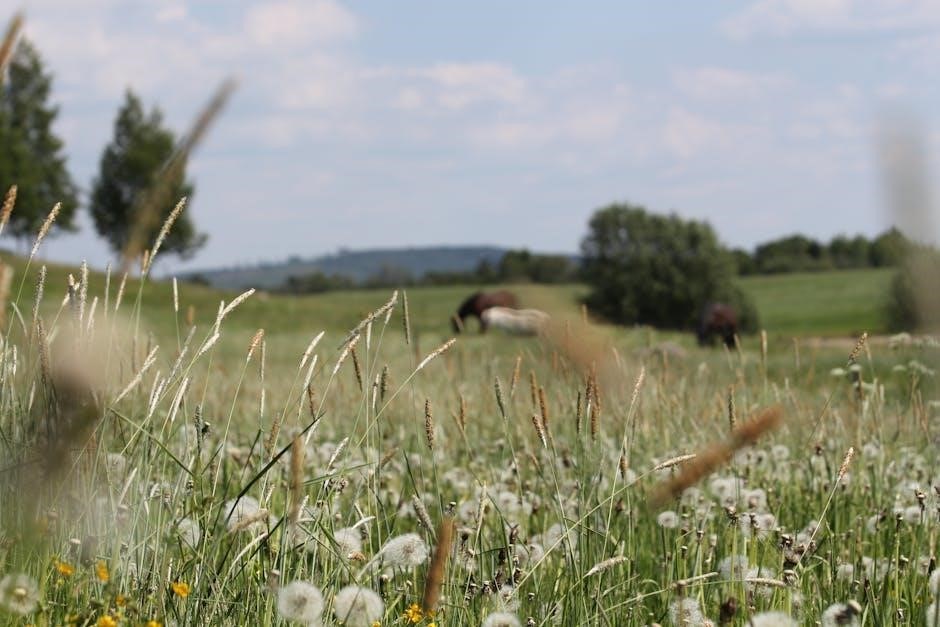
4.3. Health and Veterinary Care
Ensuring the health and well-being of farm animals is crucial for their productivity and longevity. Regular veterinary check-ups‚ vaccinations‚ and parasite control measures are essential to prevent and manage diseases. Proper hygiene practices‚ such as cleaning living areas and providing fresh water‚ help reduce the risk of illness. Farmers should also monitor animals for signs of distress or disease and seek professional advice promptly. Biosecurity practices‚ like controlling access to farm areas‚ further protect animal health. Adequate nutrition and living conditions play a significant role in maintaining overall health. Veterinarians provide guidance on diagnostics‚ treatments‚ and preventive care‚ ensuring farm animals receive the best possible care to thrive and contribute effectively to agricultural operations.
Farm Animals and Sustainability
Farm animals contribute to sustainable agriculture through eco-friendly practices‚ reducing environmental impact‚ and promoting biodiversity‚ ensuring a balanced approach to food production and animal well-being.
5.1. Sustainable Farming Practices
Sustainable farming practices involving animals focus on optimizing natural resources while minimizing environmental impact. Techniques such as rotational grazing help maintain soil health and reduce erosion. Integrating crop and animal systems ensures efficient nutrient cycling‚ lowering the need for synthetic fertilizers. Additionally‚ agroecological methods like free-range systems promote biodiversity and reduce reliance on external inputs. Farmers are increasingly adopting organic practices‚ avoiding harmful chemicals to preserve ecosystems. These methods enhance animal welfare and contribute to food security‚ fostering long-term agricultural productivity and environmental balance. By prioritizing sustainability‚ farming systems become resilient‚ benefiting both the environment and future generations.
5.2. Reducing Environmental Impact
Farming practices must prioritize environmental stewardship to minimize the ecological footprint of animal agriculture. Reducing pollution from livestock waste and fertilizers is critical‚ as these can contaminate water systems. Small-scale‚ diverse farming systems often produce fewer emissions per unit of output compared to intensive operations. Implementing manure management systems and optimizing feed use can lower greenhouse gas emissions. Additionally‚ promoting agroforestry and regenerative practices enhances soil health and sequesters carbon. Encouraging sustainable practices reduces the overall environmental impact‚ ensuring a healthier planet for future generations while maintaining productive farming systems.
5.3. Organic Farming and Animal Husbandry

Organic farming emphasizes sustainable and natural methods in raising farm animals‚ ensuring their well-being and environmental harmony. It avoids synthetic inputs‚ promoting biodiversity and eco-friendly practices. Animals are often raised in free-range systems‚ reducing stress and disease. Organic feed‚ free from genetically modified organisms (GMOs)‚ is prioritized to maintain animal health. This approach aligns with ethical animal husbandry‚ fostering a balanced ecosystem. Organic farming not only preserves soil fertility but also contributes to cleaner water and air. By adhering to strict organic standards‚ farmers promote sustainable agriculture while meeting the growing demand for healthier‚ chemical-free products‚ ultimately benefiting both humans and the environment.
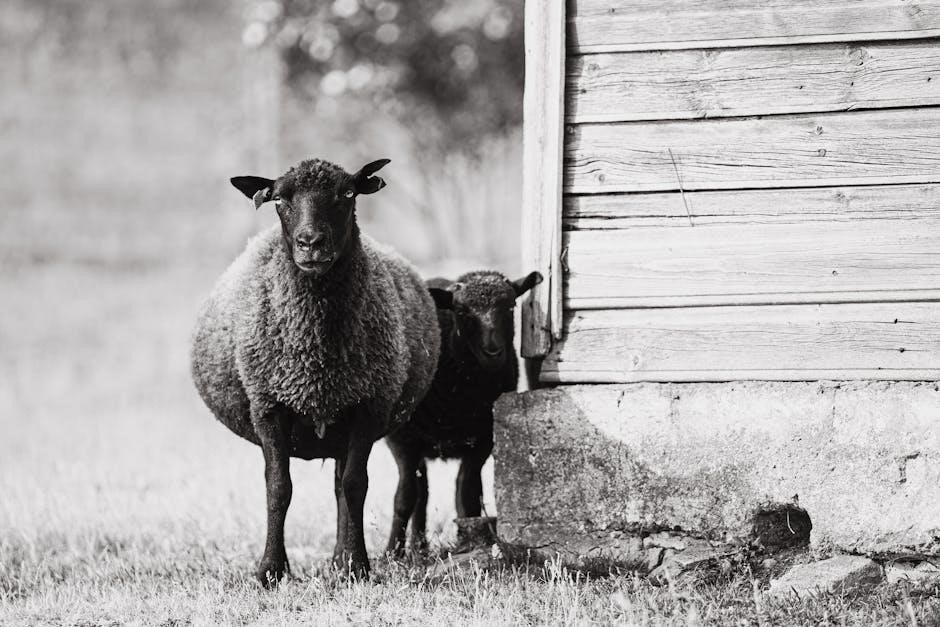
The Role of Farm Animals in Education
Farm animals play a crucial role in educational programs‚ teaching students about biology‚ responsibility‚ and sustainability while fostering empathy and understanding of agricultural practices and animal care.
6.1. Educational Programs on Farm Animals
Educational programs on farm animals are designed to teach students about agriculture‚ biology‚ and environmental science. These programs often include hands-on activities‚ such as feeding animals‚ milking cows‚ and understanding animal behavior. Workshops and guided tours provide insights into sustainable farming practices and animal husbandry. Many schools incorporate farm animal studies into their curricula‚ emphasizing the importance of animal welfare and responsible land use. Such programs not only enhance academic knowledge but also foster a connection between students and nature‚ promoting empathy and stewardship. Additionally‚ they encourage critical thinking about food production and the role of agriculture in society. These initiatives are invaluable for developing future farmers and conservationists.
6.2. Teaching Animal Care and Responsibility
Teaching animal care and responsibility is essential for fostering empathy and understanding in individuals‚ particularly children. Educational programs often emphasize the importance of proper animal handling‚ feeding‚ and grooming. By involving students in daily farm tasks‚ such as feeding livestock or monitoring animal health‚ they learn the value of hard work and compassion. These experiences also promote environmental stewardship and a deeper appreciation for sustainable farming practices. Teaching responsibility for farm animals helps individuals develop life skills‚ such as accountability and kindness‚ while encouraging a lifelong commitment to animal welfare and ethical farming. Such lessons are vital for nurturing future generations of farmers and animal caretakers.

Cultural and Historical Significance
Farm animals have shaped traditions‚ symbolism‚ and human history‚ serving as cultural icons and influencers of societal development across various regions and civilizations worldwide.
7.1. Farm Animals in History and Tradition
Farm animals have been integral to human history and traditions‚ serving as symbols of prosperity and cultural identity. From ancient times‚ animals like cattle and sheep were central to agricultural societies‚ shaping economies and traditions. In many cultures‚ farm animals are revered for their role in sustenance and labor‚ often featuring in folklore‚ art‚ and religious rituals. For instance‚ the cow is sacred in Hinduism‚ while oxen were vital in early farming civilizations. These animals have also influenced storytelling‚ as seen in fables and myths‚ reflecting their significance in human life. Their historical role continues to resonate in modern traditions‚ making them a cornerstone of cultural heritage and identity across the globe.
7.2. Symbolism of Farm Animals in Different Cultures
Farm animals hold significant symbolic meanings across cultures‚ reflecting their roles in human life. In Hinduism‚ cattle symbolize non-violence and are integral to religious rituals. In African cultures‚ they represent wealth and are used in ceremonies. Pigs symbolize fertility in some societies but are viewed negatively in Islamic and Jewish traditions. Sheep‚ symbolic of innocence‚ are central to Christian imagery. Goats represent resilience and adaptability. These symbols highlight the diverse perceptions of farm animals‚ illustrating their profound impact on cultural identity and traditions worldwide. Their enduring influence underscores the intricate relationship between humans and farm animals beyond mere utility.
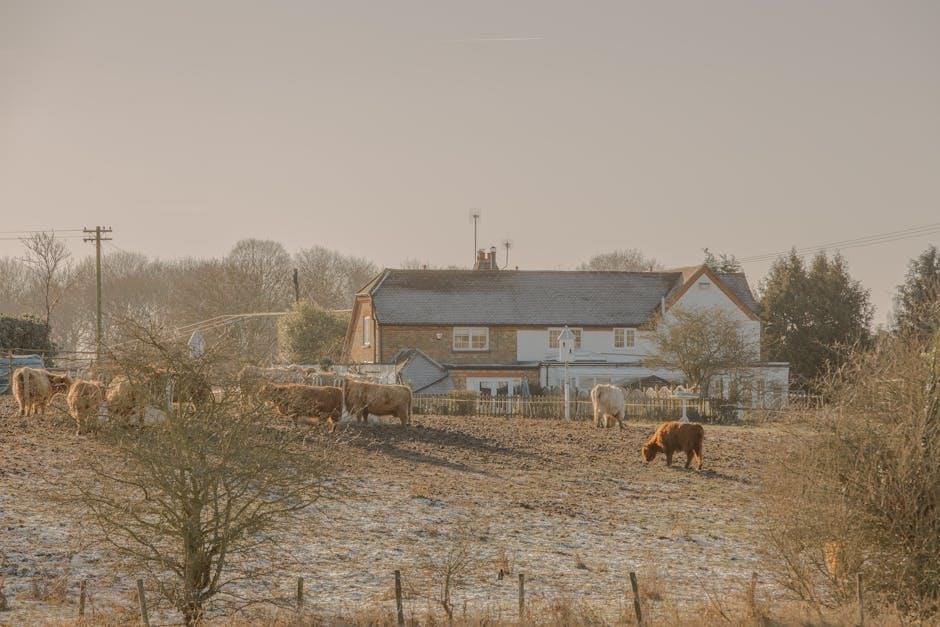
Farm animals are essential for food‚ economy‚ and culture‚ emphasizing the need for sustainable practices to ensure their welfare and continued contribution to human society.
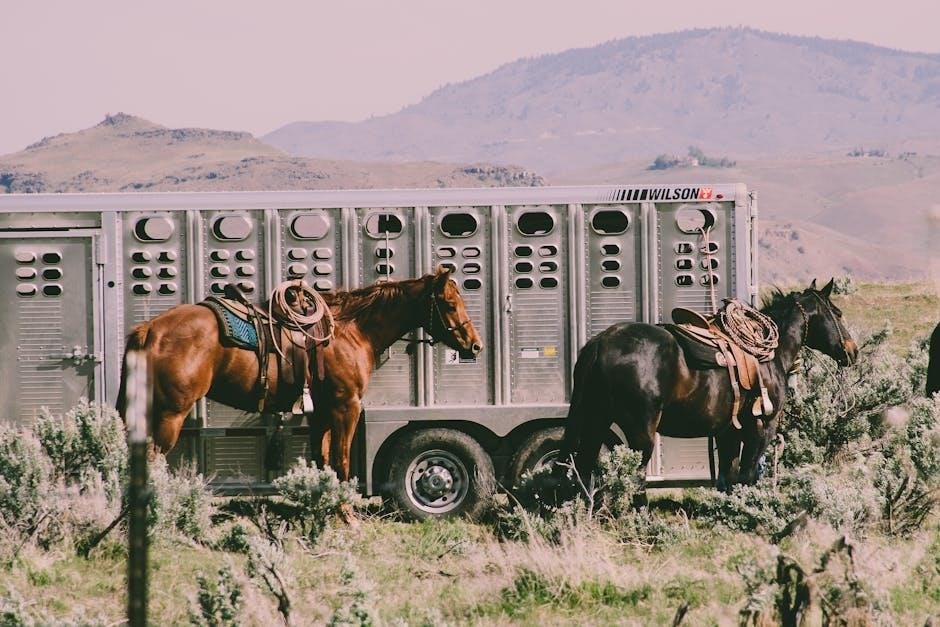
8.1. Summary of Key Points
Farm animals are integral to agriculture‚ providing food‚ labor‚ and economic stability while enriching cultural heritage. Their welfare is crucial for ethical and sustainable farming practices.
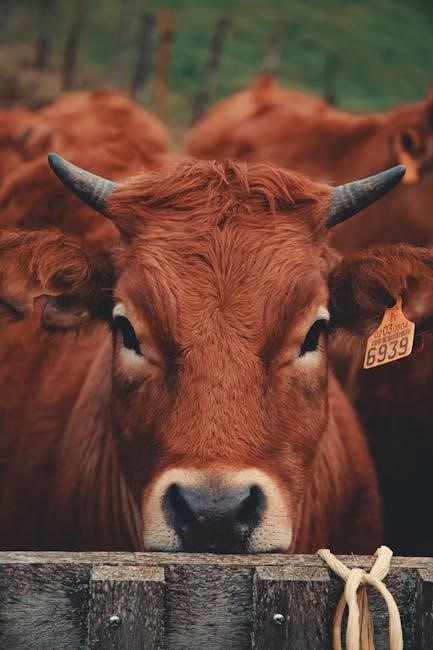
8.2. Future Perspectives on Farm Animals
The future of farm animals lies in sustainable practices‚ integrating technology with ethical animal husbandry. Advances in genetics‚ nutrition‚ and healthcare will enhance productivity while ensuring welfare. Organic farming and regenerative agriculture are expected to rise‚ promoting eco-friendly methods. Digital tools like precision farming and AI will optimize resource use‚ reducing environmental impact. Public awareness of animal welfare will drive policy changes‚ fostering humane treatment. Cultural and educational programs will highlight the importance of farm animals in heritage and food systems. Balancing productivity with sustainability and ethics will shape the evolving role of farm animals in meeting global food demands while preserving biodiversity and ecosystems.